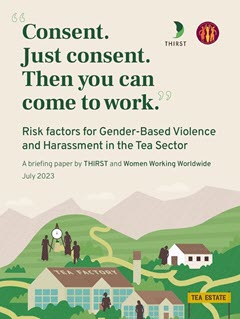Episode 135
| A 70-page case study explains the lapses at James Finlay Kenya that led to the BBC exposé Sex for Work: The True Cost of Our Tea
| Tea Price Protests in South India Continue for the Third Week
| High Temps Lower Yields of Türkiye’s Black Sea Tea
PLUS | This week, the United Nations Educational, Scientific and Cultural Organization’s World Heritage Committee, meeting in Riyadh, Saudi Arabia, inscribed the Cultural Landscape of Old Tea Forests of Jingmai Mountain in China’s Yunnan Province as a World Heritage site.
Tea News for the week ending Sept 22
Powered by RedCircle
By Dan Bolton
Widespread gender-based violence and harassment concealed in commodity supply chains withers in the public spotlight, according to a consortium of gender and tea sector experts.
This week, the consortium, led by Women Working Worldwide and THIRST, the International Roundtable for Sustainable Tea, published a report that “describes the underlying causes and multiple perilous risk factors associated with gender-based violence and harassment (GBVH) for women producing and processing tea.”
The report opens with a case study of James Finlay Kenya, a company featured in the BBC Panorama exposé, “Sex for Work: The True Cost of our Tea,” aired in February 2023.
Titled “Consent. Just consent. Then you can come to work.” (a direct quote from the exposé),” the 70-page report scrutinizes the challenges within the tea sector, pinpointing how GBVH enablers manifest specifically within the tea sector.
An infographic developed by THIRST and WWW with tea sustainability expert Michael Pennant-Jones illustrates 15 “risk points” along the supply chain. Smallholders, for example, risk abuse due to invisibility and lack of coverage by labor laws. There is a power imbalance at weigh stations where clerks or supervisors determine daily payments. In the factory, women risk abuse associated with allocating tasks, shifts, and working hours. On plantations, women face domestic violence and abuse risks in allocating housing and security issues.
In a press release, the authors explain their roles in supporting James Finlay in formulating and assessing gender policies, so they are ideally placed to explore why they ultimately failed to protect women on these tea estates.
“The document delves into James Finlay’s journey in establishing these policies and the supplementary measures taken to integrate women’s protection into their operations,” reads the release.
“A central issue highlighted is the persistently low wages for female tea workers, resulting in malnutrition, indebtedness, and the adoption of precarious survival strategies, such as transactional sex. Gender-based pay disparities exacerbate women’s vulnerability, with many relying on piece-rated plucking to bolster their earnings, even if they reside on the estate. Mechanization of harvesting further exacerbates the problem by rendering numerous women tea pluckers redundant, particularly in East Africa.
Furthermore, women in the tea sector frequently shoulder sole responsibility for their families, managing both unpaid domestic care work and paid employment. This dual burden often confines them to abusive work environments. The report is available to download at no charge at www.THIRST.international or www.women-ww.org

Episodes 1-49
Episodes 50-96
Episodes 97-135


